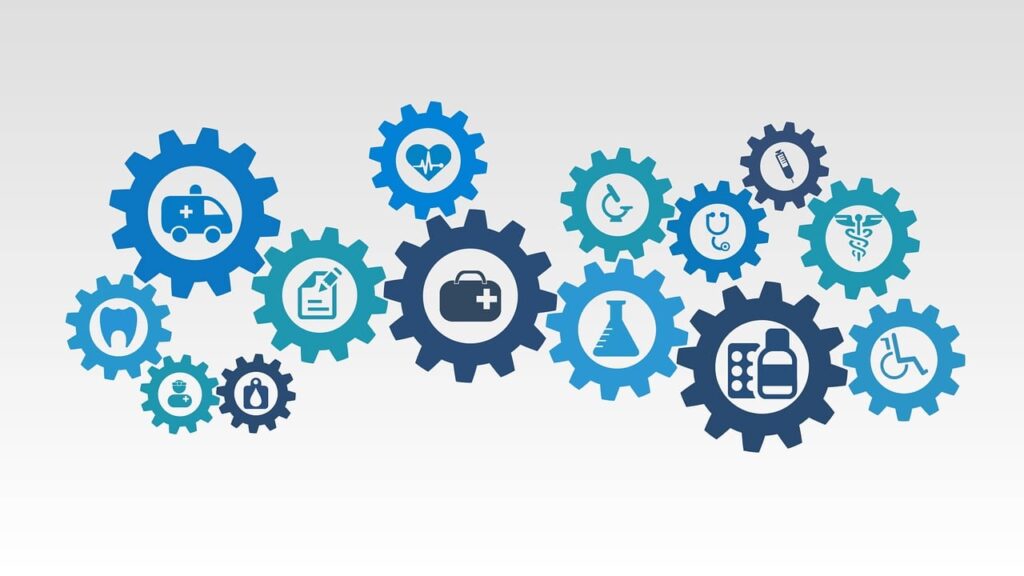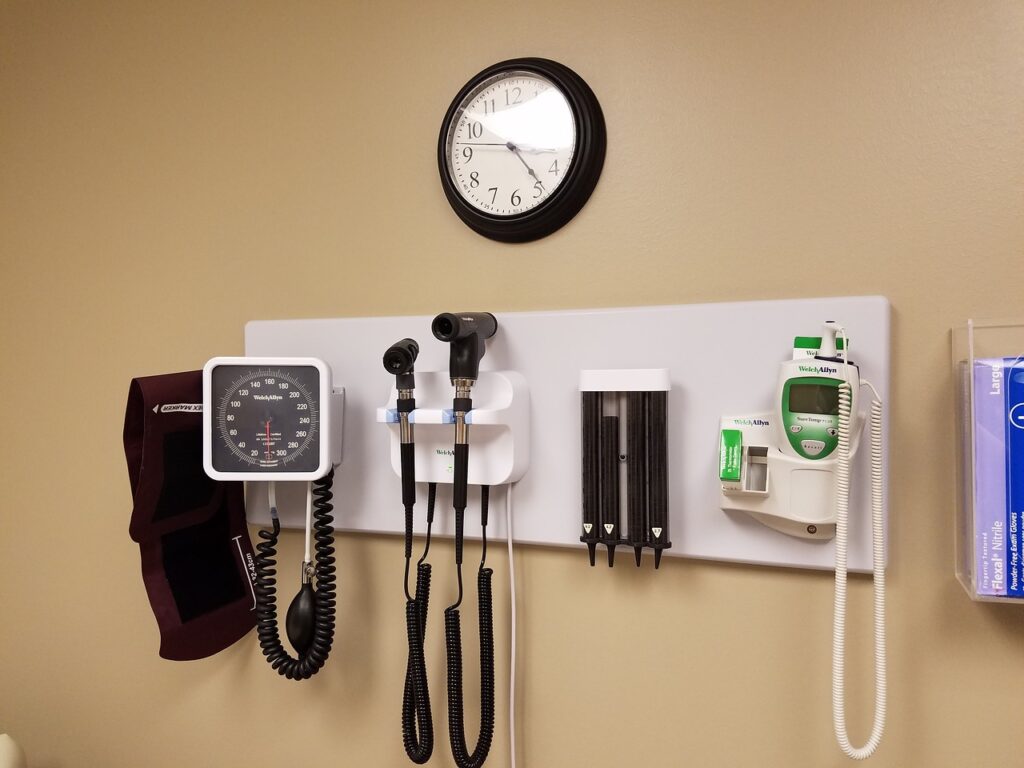Healthcare management stands as a critical component of the medical realm, orchestrating the seamless delivery of services in a sector where efficiency equates to saved lives. It embodies the administration and leadership required to run healthcare systems, hospitals, and hospital networks effectively. Today’s healthcare landscape, punctuated by rapid technological advances and evolving policy, demands adept managers to uphold the quality and accessibility of care. Careers in healthcare management do not merely support the backbone of healthcare services; they are pivotal in enhancing patient experience and operational success.
Schools Offering Relevant Degrees

Healthcare Degrees from Liberty University
BS in Healthcare Administration; B.S. in Business Administration: Healthcare Management; MBA in Healthcare Management; DBA in Healthcare Management

Healthcare Degrees from University of Phoenix
Bachelor of Science in Health Administration

Healthcare Degrees from Walden University
BS in Healthcare Management; Master in Healthcare Administration; Doctor of Healthcare Management
What is Healthcare Management?
At the core of an efficiently run healthcare system is the healthcare management profession, a field that melds together leadership, management, and administration within the healthcare industry. Healthcare management plays a pivotal role in ensuring that the delivery of healthcare services meets the necessary standards of quality, safety, and efficiency. This specialty is distinguished by its focus on the overarching operation of healthcare organizations, rather than direct patient care.
Healthcare managers find themselves in a variety of settings, each demanding a unique blend of skills and knowledge. From hospitals to private practices, and long-term care facilities to public health agencies, they orchestrate the business aspects of healthcare delivery. They are tasked with responsibilities that include strategic planning, coordinating medical and health services, managing budgets, and ensuring compliance with healthcare laws and regulations. Their role is multifaceted, involving both the management of others and the improvement of the healthcare organization’s overall performance.
What sets healthcare management apart from other healthcare professions is its systemic influence. Rather than being engaged in clinical practice, healthcare managers are the architects of their organization’s structure and the stewards of its resources. They work behind the scenes, making decisions that not only impact the operational success of their organization but also the health outcomes of the communities they serve. This distinction is critical as it positions healthcare managers as key players in shaping the future of healthcare delivery.
Key Skills in Healthcare Management
The foundation of a successful career in healthcare management rests on a set of core competencies. These essential skills are not only critical for day-to-day operations but also serve as the bedrock for effective healthcare delivery and the achievement of organizational success. Professionals in this field are expected to navigate complex healthcare systems and lead teams with expertise and confidence.
Effective communication stands at the forefront of these skills, enabling managers to convey information clearly and concisely to diverse audiences. Strategic thinking and analytical abilities allow them to foresee industry trends and adapt to the evolving healthcare landscape. Proficiency in financial acumen ensures that they can make informed decisions that align with fiscal stability and healthcare objectives. Leadership and ethical decision-making are imperative as these managers shape the healthcare environment and influence patient outcomes.
An adept healthcare manager must also possess a deep understanding of healthcare policy and regulations to ensure compliance and advocate for change when necessary. They must be skilled in human resources management, fostering a supportive and productive workplace culture. In addition, technological competency is increasingly important, with a growing reliance on health informatics and data management to improve patient care and operational efficiency.

How to Get Into Healthcare Management
The journey into healthcare management is both structured and dynamic, offering numerous opportunities for professional growth and personal satisfaction. Embarking on this path requires a blend of education, hands-on experience, and an unwavering commitment to continuous improvement. Let’s delve into the foundational steps that pave the way to a flourishing career in this pivotal sector of healthcare.
Starting with education, securing a relevant degree is paramount. Healthcare management professionals must possess a comprehensive understanding of both business principles and the healthcare system. Degrees that balance these disciplines—such as a Bachelor’s or Master’s degree in Healthcare Management, Healthcare Administration, or a related field—provide a solid academic foundation.
Parallel to academic pursuits, internships, and fellowships offer invaluable real-world experience. They serve as a crucial bridge between theoretical knowledge and practical application, allowing aspiring managers to observe and participate in the inner workings of healthcare operations. These experiential learning opportunities can be a significant advantage in the competitive job market.
When it comes to work experience, there’s no substitute for time spent in the trenches of healthcare facilities. Early career positions, even those outside of direct management, can equip future leaders with a nuanced understanding of patient care, regulatory compliance, and the daily challenges faced by healthcare providers.
With experience comes the need for a strong resume. It should not only reflect academic achievements and work history but also demonstrate leadership, problem-solving, and an ability to innovate within healthcare settings. A resume is a professional narrative that opens doors to advanced positions in the field.
Lastly, professional certification can be a catalyst for career advancement. Certifications like the Fellow of the American College of Healthcare Executives (FACHE) signal a dedication to excellence and a mastery of industry standards. They can distinguish a healthcare manager and propel them to higher levels of leadership and responsibility.
Each step on the path to a career in healthcare management is an integral part of a larger journey toward leadership in an industry that demands both compassion and efficiency. As you move forward, remember that the field is ever-evolving, and so too should be your approach to professional development.
Education and Training for Healthcare Management Careers
The cornerstone of a successful career in healthcare management undoubtedly rests upon a foundation of robust education and targeted training. Grasping the full spectrum of healthcare operations, finance, policy, and administration requires a commitment to learning that is both comprehensive and continuous. For those eager to navigate the complexities of this field, an array of degrees and certifications stand as critical milestones along the path to leadership roles.
Aspiring healthcare managers are encouraged to consider undergraduate degrees in healthcare management, health administration, business administration, or a related field as a starting point. Such programs imbue students with the fundamentals of healthcare systems, including ethical and legal considerations, economics, and strategic planning. Progressing further, master’s degrees, particularly a Master of Healthcare Administration (MHA) or an MBA in healthcare management, are highly regarded credentials that can distinguish individuals in a competitive job market.
Equally important are professional certifications which serve as indicators of expertise and dedication to the field. Certifications such as the Certified Professional in Healthcare Management (CPHM) or the Fellow of the American College of Healthcare Executives (FACHE) are often pursued by those looking to underscore their commitment to healthcare leadership and excellence.
The Role of Internships, Fellowships, and Work Experience
In the journey to becoming a seasoned professional in healthcare management, practical experience stands as a cornerstone for success. It’s the bridge between academic theories and the real-world dynamics of the healthcare industry. Internships and fellowships offer invaluable opportunities to immerse oneself in the professional environment, while work experience cements one’s ability to manage complex healthcare systems effectively.
To secure a position that allows for such experiential learning, one must be strategic. Begin by researching organizations known for their robust internship or fellowship programs. Networking plays a pivotal role here; reach out to industry professionals and alumni who can provide insights and potentially facilitate introductions. When evaluating opportunities, consider not only the prestige of the program but also the breadth of experiences you will gain.
Once you embark on an internship or fellowship, it’s crucial to maximize the experience. Be proactive in seeking out projects that challenge you and allow you to showcase your growing skill set. Take the initiative to learn about different departments and understand the interplay between various roles within the healthcare system. Remember, the goal is to emerge not just with new skills but also with a professional network and a nuanced understanding of healthcare management.
For those already in the workforce, leveraging your current position can be equally beneficial. Seek out projects that align with healthcare management, volunteer for cross-departmental committees, or propose initiatives that can improve efficiency or patient care. Such work experiences not only enhance your resume but also demonstrate your commitment to the field and your capacity for leadership.
Ultimately, the combination of internships, fellowships, and hands-on work experience serve as the foundation upon which a successful career in healthcare management can be built. It’s these practical engagements that transform knowledge into wisdom and students into leaders.
Certification and Licensure in Healthcare Management
Professional certifications stand as a testament to a candidate’s commitment to excellence and adherence to industry standards. These credentials often serve as a key differentiator in the competitive healthcare landscape, providing individuals with a mark of credibility that can enhance career prospects and open doors to new opportunities. Certifications such as the Fellow of the American College of Healthcare Executives (FACHE) or the Certified Professional in Healthcare Management (CPHM) are highly sought after, and for good reason.
Attaining a certification does more than just bulking up your resume; it signals to potential employers a professional’s dedication to their craft and their proactive approach to staying abreast of the latest developments in the field. The benefits of obtaining such credentials are multifaceted. They not only bolster one’s reputation within the healthcare community but also potentially lead to better job positions, higher salaries, and a broader range of career opportunities.
For those aspiring to advance their careers in healthcare management, the pursuit of certification is a strategic move. It is a clear demonstration of expertise and a deep understanding of the complexities inherent in managing healthcare organizations. As the healthcare sector continues to evolve, the importance of professional certification in maintaining a competitive edge cannot be overstated.

Healthcare Management Career Paths and Specializations
The healthcare management field offers a variety of careers that involve overseeing the business and administrative aspects of healthcare organizations. Here are some careers within the healthcare management field:
Healthcare Administrator/Manager
Responsible for overall management and administration of healthcare facilities. They may work in hospitals, clinics, nursing homes, or other healthcare settings.
Health Services Manager
Plans, directs, and coordinates the delivery of healthcare services. They may manage specific departments or entire healthcare organizations.
Hospital CEO (Chief Executive Officer)
The top executive responsible for the overall leadership and management of a hospital. They make strategic decisions, set organizational goals, and ensure efficient operations.
Clinical Manager
Oversees specific clinical departments or units within a healthcare facility. Clinical managers may be responsible for ensuring the quality of patient care and coordinating clinical staff.
Health Information Manager
Manages and secures healthcare data, including patient records and health information systems. They ensure compliance with data protection regulations.
Practice Manager
Manages the day-to-day operations of medical practices, including staffing, budgeting, and patient relations. They may work in primary care or specialty practices.
Healthcare Consultant
Provides advice and expertise to healthcare organizations to improve efficiency, reduce costs, and enhance overall performance. Consultants may specialize in areas such as finance, operations, or strategic planning.
Healthcare Financial Manager
Oversee the financial aspects of healthcare organizations, including budgeting, financial reporting, and reimbursement. They may work to optimize revenue cycles and control costs.
Health Policy Analyst
Analyze healthcare policies and regulations. They may work for government agencies, advocacy groups, or research organizations to assess the impact of policies on healthcare delivery.
Managed Care Coordinator
Work with insurance companies or managed care organizations to coordinate healthcare services for covered individuals. They may ensure that patients receive appropriate and cost-effective care.
Quality Improvement Manager
Focus on improving the quality of healthcare services within an organization. They may develop and implement quality improvement initiatives and monitor compliance with healthcare standards.
Nursing Home Administrator
Oversee the operations of nursing homes and long-term care facilities. They manage staff, budgets, and ensure compliance with regulations.
Healthcare IT Manager
Manage the implementation and maintenance of healthcare information technology systems. They play a crucial role in ensuring the effective use of electronic health records and other technology solutions.
Medical Office Manager
Manage the administrative functions of medical offices, including scheduling, billing, and staff coordination.
These roles require a combination of healthcare knowledge and management skills. Educational backgrounds in healthcare administration, business administration, or related fields are common for professionals in healthcare management careers.

Career Progression Within the Healthcare Management Field
Career progression within healthcare management often involves advancing through various levels of responsibility, gaining experience, and acquiring additional skills or qualifications. Here are some examples of career progression within healthcare management:
Entry-Level Positions
Begin with entry-level positions such as administrative assistant, medical secretary, or receptionist in a healthcare setting. These roles provide exposure to the administrative aspects of healthcare.
Healthcare Coordinator
Progress to a healthcare coordinator role where responsibilities include scheduling, coordinating patient appointments, and managing administrative tasks. This position may also involve liaising between different departments.
Assistant Healthcare Manager
Move into an assistant healthcare manager role, working closely with healthcare managers or administrators. This position involves taking on more responsibilities related to staff management, budgeting, and day-to-day operations.
Health Information Manager
Specialize in health information management, overseeing the handling of patient records, ensuring compliance with regulations, and managing health information systems.
Practice Manager
Transition to a practice manager role, responsible for managing the operations of a medical practice. This includes staffing, budgeting, and ensuring smooth day-to-day functioning.
Clinical Manager
Advance to a clinical manager position, overseeing specific clinical departments or units within a healthcare facility. Clinical managers play a crucial role in ensuring the quality of patient care.
Director of Healthcare Operations
Progress to a director-level position where responsibilities include overseeing the overall operations of a healthcare facility or a specific department. This role involves strategic decision-making and leadership.
Healthcare Executive/Chief Operating Officer (COO)
Reach executive levels such as COO or healthcare executive, where you would be responsible for the overall management and strategic direction of a healthcare organization.
Chief Executive Officer (CEO)
In some cases, professionals may aspire to become CEOs of healthcare organizations, leading the entire organization and making high-level strategic decisions.
Continuous learning, professional development, and obtaining advanced degrees or certifications in healthcare management or related fields can contribute to career progression within the healthcare management sector. Networking and gaining a diverse set of experiences also play key roles in advancing one’s career.

Salary Expectations and Job Outlook
The healthcare management field is experiencing a dynamic shift, influenced by technological advancements, regulatory changes, and an increasing emphasis on patient-centered care. This evolution lays the groundwork for both burgeoning opportunities and competitive salary prospects within the industry. When considering a career in healthcare management, understanding the financial and professional landscape is pivotal.
Current trends suggest an increasing demand for healthcare management professionals. This is due in part to an aging population requiring more healthcare services, and the subsequent need for skilled managers to oversee these complex systems. The Bureau of Labor Statistics projects a 28% growth rate for medical and health services managers, this far exceeds the average for all occupations, indicating robust job security and opportunity for those in the field.
When dissecting salary data, it’s evident that remuneration in healthcare management is influenced by several factors, including the specific role, level of experience, and geographic location. For instance, a Healthcare Administrator in a bustling metropolitan area such as NYC may command a higher salary compared to their counterpart in a rural setting. This variation underscores the importance of geographical considerations when evaluating potential earnings.
Furthermore, specialized roles within healthcare management can attract different salary ranges. A Hospital Administrator’s compensation package might differ significantly from that of a Health Information Manager or a Clinical Director, each role bringing its own set of responsibilities and required expertise. Recognizing these distinctions is crucial when planning a career path and setting salary expectations.
Careers in healthcare management not only offer the chance to make a significant impact on patient care and outcomes but also provide promising financial rewards. Prospective healthcare managers are encouraged to research and consider the various factors that influence employment prospects and salaries in this field to fully harness the potential of their career trajectory.
Crafting a Strong Healthcare Management Resume
The foundation of any successful job application is a resume that captures attention. In the competitive field of healthcare management, your resume must not only stand out but also reflect the full range of your capabilities. Let’s explore how to construct a resume that effectively highlights your education, skills, and experience.
Resume Structure
Beginning with the structure, ensure your resume is immaculately organized. This means clear headings, a logical flow from section to section, and bullet points to enhance readability. Your contact information should be prominently placed at the top, followed by a professional summary that succinctly encapsulates your qualifications and career objectives.
Education
When detailing your education, list your most recent and relevant qualifications first. This could include a degree in healthcare management, business administration, or any related field. Be sure to mention any honors or distinctions, as they can set you apart from other candidates.
Skills Section
Your skills section must reflect the specific demands of healthcare management. Showcase your leadership abilities, your knack for strategic planning, and your proficiency in healthcare policy and ethics. If you possess practical knowledge in healthcare information systems, make it known.
Experience
Experience is where you can truly shine. Document your career trajectory, emphasizing positions of responsibility and any projects that demonstrate your ability to improve processes or lead teams. Quantify your achievements where possible, such as by stating how you increased departmental efficiency by a certain percentage or reduced costs.
Remember, your resume is your personal marketing document. As such, it should be tailored for the role you’re applying for, reflecting the most relevant aspects of your experience and skills. It should also be accompanied by a cover letter that can speak more directly to your interest and suitability for the position at hand.
While crafting your resume, keep the language clear and professional, mirroring the tone of the healthcare management field. Avoid jargon, but do use industry-specific terms where they are appropriate and add value to your presentation. Above all, proofread meticulously; attention to detail is key in a field where precision is paramount.

Real-World Application: Job Responsibilities in Healthcare Management
Healthcare management professionals stand at the helm of medical facilities, guiding teams and shaping patient experiences. Their responsibilities encompass a range of tasks, requiring a unique blend of leadership, organization, and industry knowledge. Daily, healthcare managers may engage in activities such as coordinating with medical staff, managing budgets, and ensuring compliance with healthcare laws. These day-to-day tasks ensure the smooth operation of healthcare services and the delivery of high-quality care to patients.
But their role extends beyond immediate tasks. Long-term responsibilities involve strategic planning, policy development, and continuous process improvements to adapt to the ever-evolving healthcare landscape. Healthcare managers must anticipate future challenges, from changes in healthcare regulations to advances in medical technology, and devise strategies to keep their organizations ahead of the curve.
In this fast-paced environment, adaptability becomes a cornerstone of effective healthcare management. As the healthcare field expands and transforms, managers must be adept learners, staying abreast of new healthcare models, technology, and best practices. Continuous learning is not an option but a necessity for those wishing to excel in healthcare management and lead their organizations to success.
Advance Your Career
Embark on a journey to elevate your career with Pathways to Advancement. As you consider the next steps in your healthcare management career, remember that the right education and training can set you apart. Our platform is tailored to adult learners and non-traditional students seeking relevant, affordable education options. Whether you’re aiming for leadership roles or seeking expertise in specific healthcare sectors, we provide access to a wide range of educational pathways, including online degree programs, certificate programs, and job training programs that prepare you for high-demand fields.
